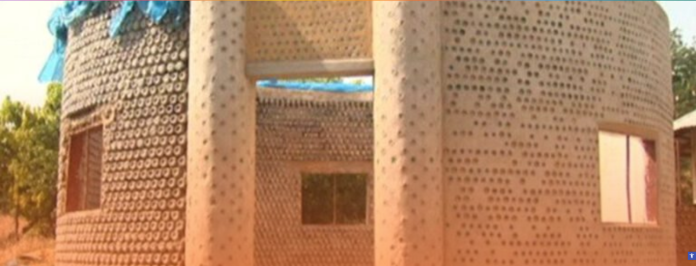In a world grappling with plastic waste, Nigeria has embarked on a remarkable journey to repurpose discarded plastic bottles into homes using “bottle brick” technology. This eco-friendly initiative has not only gained popularity among locals but has also attracted attention from tourists and government officials, showcasing the innovative potential of recycling.
The Aesthetics and Construction Process:
Nigeria’s first plastic bottle home in Yelwa stands as a testament to the surprising beauty of repurposed plastic. The unique design, with the round bottoms of the bottles facing outward, has turned what might seem like an eyesore into an eye-catching architectural marvel. The construction involves filling the bottles with sand, stacking them on their sides, and bonding them together with mud, adhering to the traditional round architecture of northern Nigeria.
Affordability and Environmental Impact:
The “bottle brick” technology, which originated nine years ago in India and South/Central America, offers an affordable and eco-friendly alternative to traditional brick homes. According to Yahaya Ahmed of Nigeria’s Development Association for Renewable Energies, plastic bottle homes cost 67% less than concrete and brick constructions. Moreover, these homes are not only durable and earthquake-resistant but also provide effective insulation against Nigeria’s intense climate.
Challenges and Concerns:
While the project has garnered widespread enthusiasm, concerns have been raised about the increased demand for sand, potentially driving up its cost. Critics like Mumuni Oladele, a mason in southern Lagos, fear that the quest for affordable housing may lead to unsustainable sand extraction practices.
Social and Environmental Impact:
Despite the challenges, the plastic bottle homes initiative has brought about positive social and environmental changes. The construction project provides employment opportunities for children, giving them a sense of purpose and a chance to earn income for the future. Additionally, the initiative addresses the plastic pollution crisis in Nigeria, where inadequate recycling facilities have led to plastic piling up in streets and alleyways.
Future Prospects:
With the successful completion of 25 structures, the Development Association for Renewable Energies plans to expand its efforts by constructing a school on the estate. This endeavor aims to provide education and further opportunities for the community, emphasizing the long-term benefits of sustainable building practices.
Conclusion:
The plastic bottle homes in Nigeria stand as a testament to human ingenuity and the potential for positive change in the face of environmental challenges. This innovative approach not only addresses the pressing issues of plastic pollution and affordable housing but also fosters community development, creating a blueprint for a more sustainable and environmentally conscious future. As this initiative continues to grow, there is hope that similar projects will emerge, turning waste into opportunities for communities worldwide.
image source : power of positivity










